Another instalment from the series “Curing Cancer with Photoshop“. This time, the hero is Eric Lam, breast cancer researcher and professor of molecular Oncology at Imperial College in London. Lam’s lab consists by his own count of “12-18 researchers”, Imperial had to stress that it “is made up from 15 females”. However, a number of problematic papers from Lam lab have male first authors.
This cancer fighting hub at Imperial is funded by British national funders Medical Research Council (MRC), Cancer Research UK and Biotechnology and Biological Sciences Research Council (BBSRC). Major research focus is on the Forkhead Box proteins, in particular FOXM1, a transcription factor implicated in cancer development. A pedestrian approach many cancer researchers take, where similar-looking papers on slightly varying topics of the same gene are produced, none of them too unorthodox or earth-shattering to attract scrutiny as to how those results came to be. Lam’s science is not controversial for that, and with 250 papers it is the combined quantity and mediocrity which let his research stand unquestioned. Yet if one does look closely, as the data integrity sleuth Clare Francis did and posted it on PubPeer, one finds duplicated western blot bands and irregularly spliced gels. Maybe it is a novel molecular pathway of FOX proteins, to be harnessed for a cancer cure?
What this article shows, is actually nothing scandalous. It is simply the boring banality of bad science in cancer research which PubPeer is full of. Lam is just one of many successful academic oncologists who knows what is needed to successfully publish papers in respectable society journals.
We can start with an early work from Lam lab, where Sunters et al J Biol Chem 2003 proved that FOXO3a and FOXO1a proteins are involved in apoptosis of cancer cells treated with a chemotherapeutic agent. Not really a surprising result, under the circumstances, but it still needed some tweaking. In a certain cancer cell line, this paclitaxel treatment had a bizarre effect of duplicating, or even triplicating gel bands inside the loading control. Apparently, an extracellular Photoshop-defence mechanism against undesired results gets activated, which then provides FOXO3a and FOXO1a phosphorylation in a tubulin-western blot band-dependent matter. Amazing science at the forefront of war on cancer at Imperial.
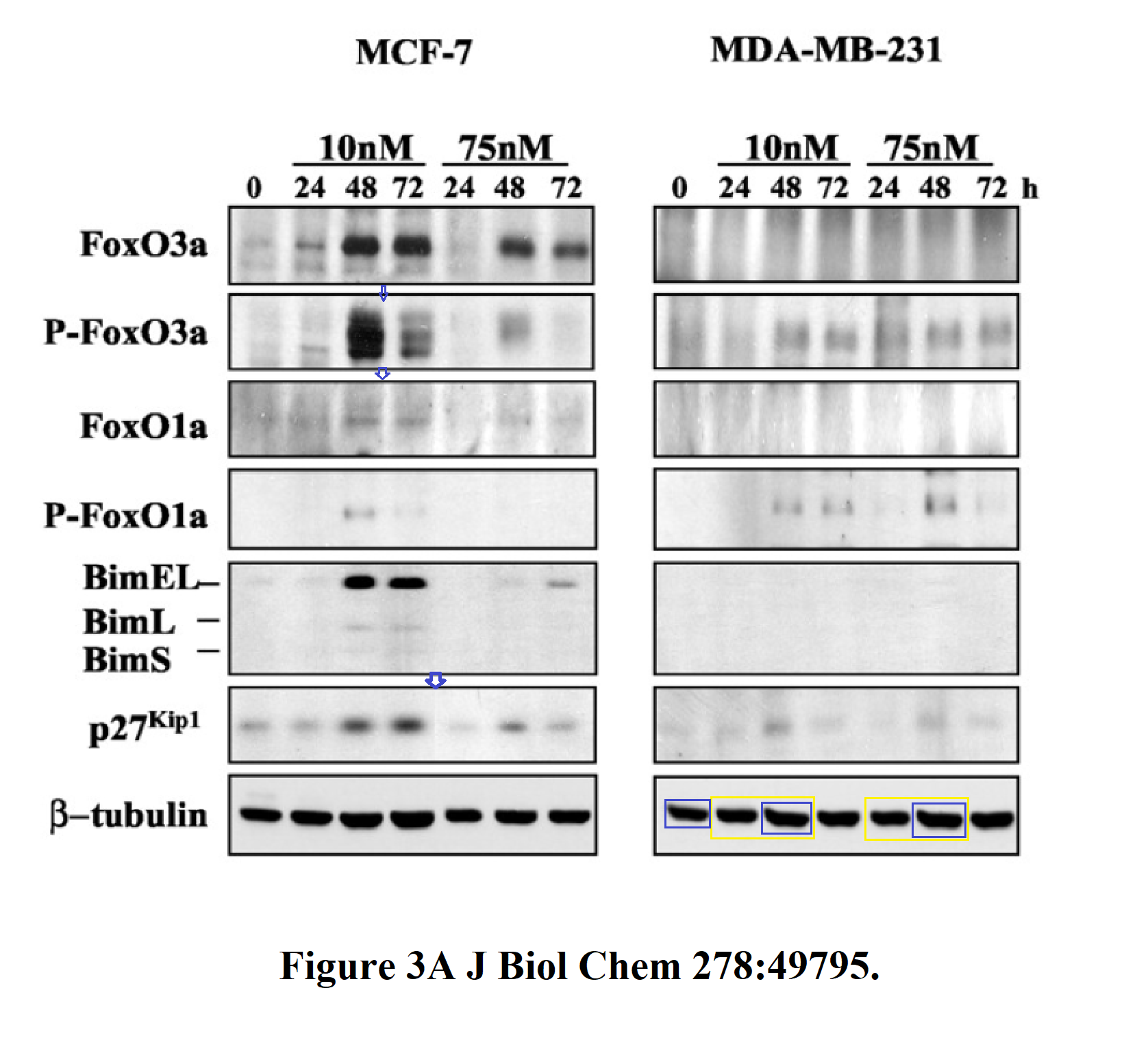
The Fernandez De Mattos et al, Mol Cancer Ther, 2008 paper from the Lam lab is also an interesting example in this regard. Who would have expected that the chemotherapeutic agent cisplatin will not only reduce the phosphorylation of FOXO3a protein, but also lead to a duplication of a p-FOXO3a gel band? Serendipitous discoveries like this is what drives cancer research!

Or this paper Francis et al, Int J Oncology, 2009, where Lam found out the key role of FOXM1 in breast cancer. The effect is that universal, that cancer cell lines produce identical western blots even when treated with utterly different pharmacological inhibitors, and in different publications. This is why two western blot panels from that paper are found in Mc Govern et al, Mol Cancer Ther, 2009, another Lam paper published by American Association for Cancer Research (AACR).

The effect spreads even further inside the McGovern et al 2009 paper. 4 loading controls were re-used, but not the fifth one because it apparently already was delegated to moonlight in the parallel Francis et al 2009 paper.
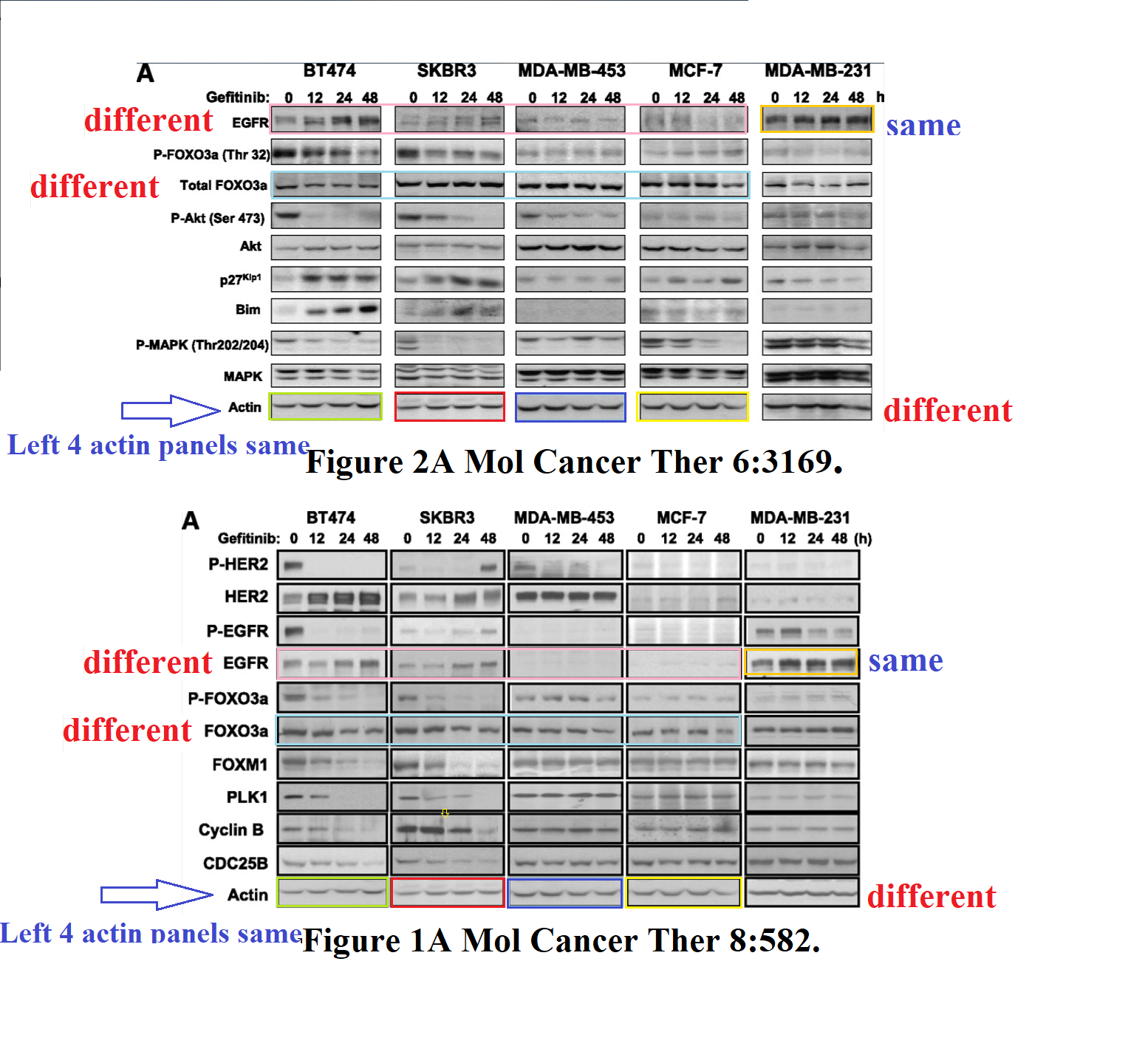
The following Lam study gives insights into his mentorship practice. Jimmy Kwok did his PhD udner Lam and is now head of London oncology division with the private healthcare provider HCA Healthcare UK. He is also a registered Ashtanga yoga instructor and helps cancer patients by selling them his books on yoga. There is lots for Kwok to mediate on himself though, for example on his paper Kwok et al Mol Cancer Research 2010 and his PhD thesis from same year.
Can yoga explain that western blot bands showing the expression of an oncogene look identical between control and chemotherapeutic agent-treated cells? Especially that these gels bands were squeezed vertically to look smaller when the therapy began?

The exactly same figure, with same duplication, is present in Kwok’s PhD thesis, supervised by Lam. The thesis also has other issues, like those amazing reproducible flow cytometry plots, despite different time points:

This was what Lam published together with another Imperial colleague, Simon Wagner (who is now with University of Leicester). The paper Batlle et al Mol Immunology 2009, published with Elsevier, proves that in the end, anything goes and nothing matters. Nobody cares, or looks, or actually peer reviews. Some brightness touch-up suffices to make results from different experiments interchangeable inside the same figure. Leukaemia solved, the easy Imperial way.

Other concerns in Lam’s papers are hidden irregular gel splicing, mismatching loading controls, which both make western blot results rather unreliable, or occasional duplications like in Barnouin et al J Biol Chem 2002.
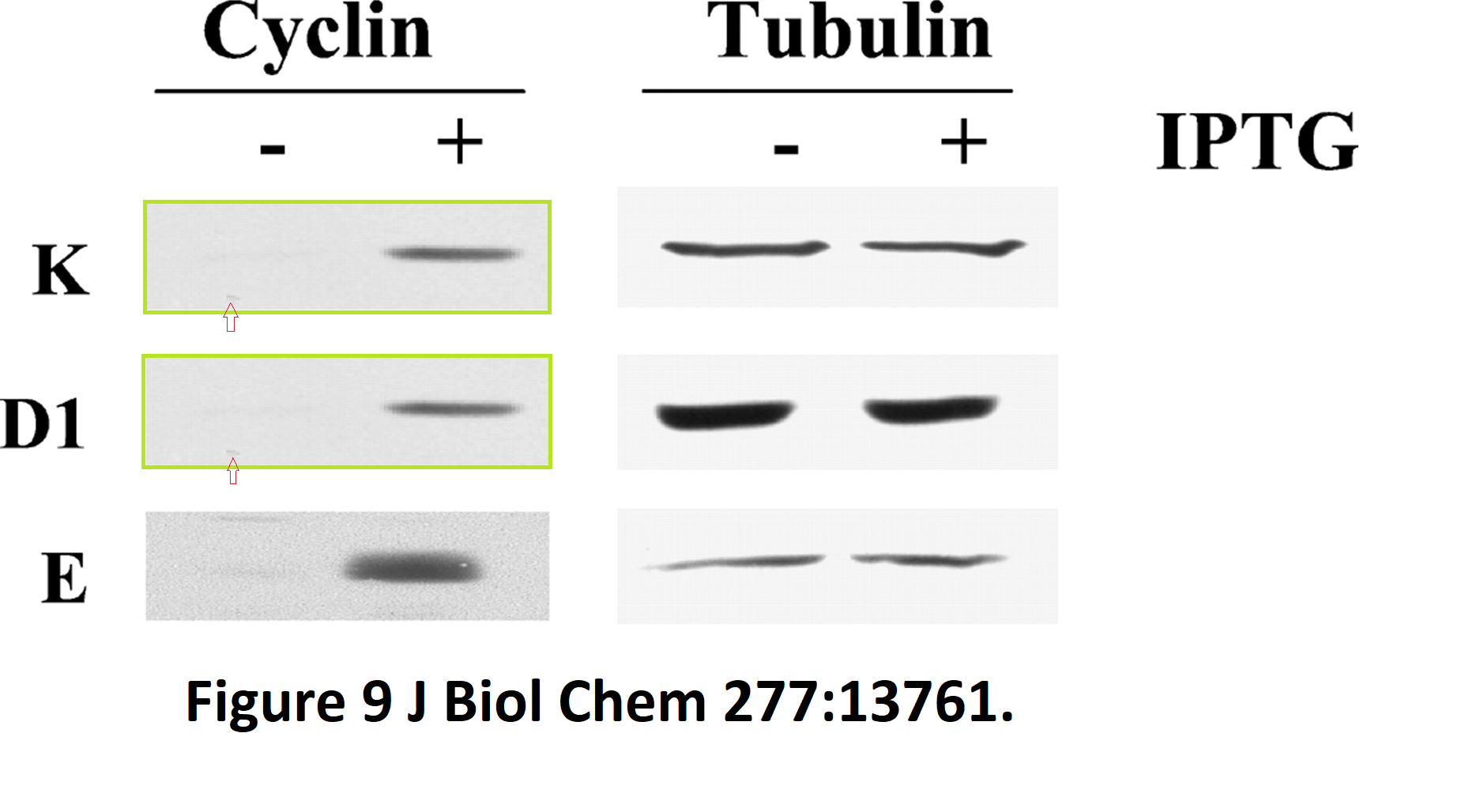
The bigger problem is that in cancer research, all these issues in Lam’s papers are nothing special. None of them. Those problematic western blots Lam published are boringly common. Just in UK, there are many other cases of photoshopped cancer research discussed on PubPeer, my site alone documents ICR London, Cardiff University , or even another lab at Imperial. Even more, Lam’s own superior Iain McNeish, Head of Division of Cancer of Department of Surgery and Cancer at Imperial published something rather inappropriate in his own youth, also at Imperial, in McNeish et al, Cancer Gene Ther, 2001. This is just one example of duplicated gel bands in that paper of his, more is on PubPeer.

Even more can be found on PubPeer in the works in of McNeish et al 2001 last author, Nick Lemoine, formerly professor of molecular pathology at Imperial and now Chair of the Bart’s Cancer Institute in London. That was also mostly posted by pseudonymous sleuth Clare Francis, who also informed the universities involved. Not that anyone cares, just like with ICR, also on Bart’s case it will the institute director investigating himself. Lemoine is also Chair of trustees at MRC, in case anyone is concerned about MRC’s attitude to research integrity, they can complain to Professor Lemoine.
It is basically a culture of mutual back-scratching and one hand washes the other in cancer research. Lam might be not the biggest shark in the pond, but one quickly sees that those above him and at the helm of British cancer research are, let’s put it this way, conflicted themselves. Yet this kind of bad science quickly leads to clinical trials, with millions of pounds, dollars or euros wasted, where thousands of cancer patients are given false hope and subjected to potentially dangerous therapies based on a flimsy, unreliable or plain fake lab data. Those same people unable to present a convincing western blot without the help of Photoshop, keep asking the public to donate to cancer research.
Maybe this is why there is so little progress relative to the enormous financial effort worldwide. What if the really radical approach to war on cancer would be not throwing good money after bad in Moonshot programmes, not inventing new crazy theories of cancer, not stripping patients of basic protection so new methods can be quickly tested on them on a hunch, but introducing some basic research integrity for a change? It would cost very little, in fact it would liberate enormous sums which more honest scientists could use for better science.
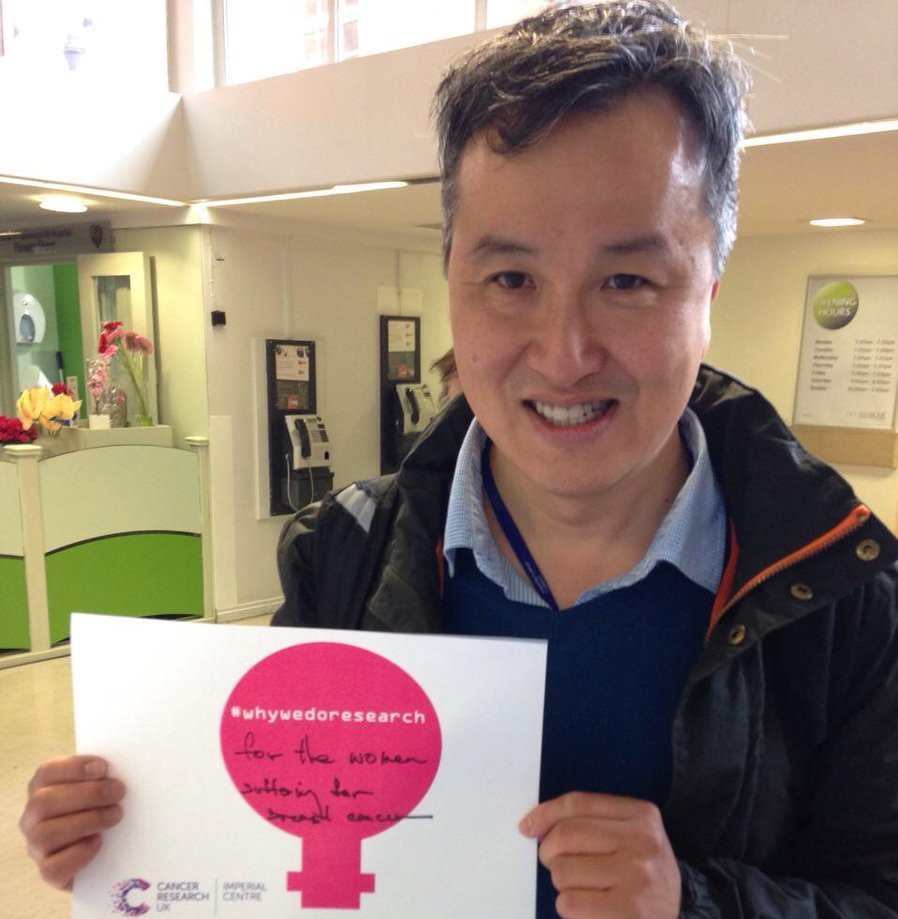
Update 25.11.2018. Same day and just a couple of hours after this article appeared, Lam’s Head of Department Iain McNeish went to PubPeer to share the results of an investigation on his own problematic paper with Nick Lemoine, in this comment. In brief, the gel band duplications were confirmed and original data was not available. This was exactly the reason why Imperial and Bart’s Cancer Institute decided not to retract or even to correct the paper. And anyway, some of the duplicated bands were, as McNeish said, “only control lanes”. McNeish announced to be now in charge of monitoring and punishing exactly same transgressions as his own paper shows.
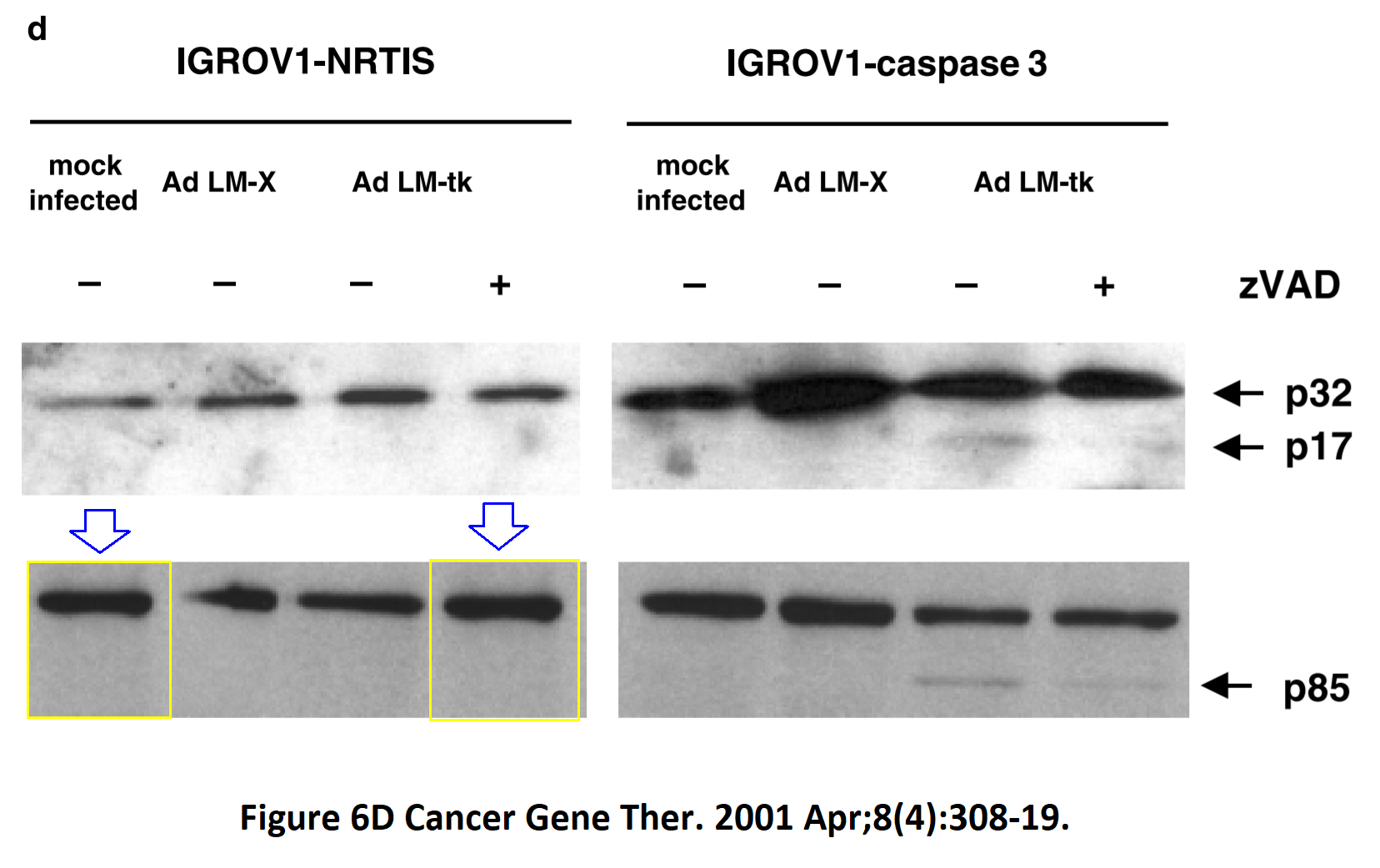
In Britain, goats are appointed gardeners, by other goats.
Quote by McNeish:
“None of these issues in my opinion change the conclusions made in the papers. I see no merit in retracting these important publications or publishing an erratum at this late stage, although agree that there have been errors made in producing the figures.
It should also be noted that the original data was no longer available for review. […] The investigation stated that the conclusions made from the published studies were valid and important, even accounting for these reporting errors.
I recommend that measures are put in place to avoid such issues surrounding research data quality and reporting in future. […]
As first author, I accept the findings of this investigation. The Division of Cancer at Imperial College has now established a data integrity committee that will investigates suspected data irregularities and also to review the current practices relating to research data storage and reporting.”

Donate!
If you are interested to support my work, you can leave here a small tip of $5. Or several of small tips, just increase the amount as you like (2x=€10; 5x=€25). Your generous patronage of my journalism will be most appreciated!
€5.00


J Biol Chem. 1999 Apr 23;274(17):12009-16.
Modulation of E2F complexes during G0 to S phase transition in human primary B-lymphocytes.
van der Sman J1, Thomas NS, Lam EW.
Author information
1
Ludwig Institute for Cancer Research and Section of Virology and Cell Biology, Imperial College School of Medicine at St Mary’s, London W2 1PG, United Kingdom.
Figure 2B.
LikeLike
Figure 5.12, PhD Thesis H R Upekha Karunarathna, Imperial College, London 2017.
PhD supervisor prof Eric Lam.
LikeLike
Figures 3-27, PhD Thesis Jimmy Kwok Imperial College, London 2010.
LikeLike
Fuun that this does not apply to faculty.
https://www.bbc.co.uk/news/education-46530639
“Cheating university students face FBI-style crackdown”.
LikeLike
Figure 3-21, page 185, PhD thesis Jimmy Kwok, Imperial College London 2010.
PhD supervisor prof Eric Lam.
Left untreated MCF-7 and left untreated MCF-7-CISR (different cell lines) means (black solid squares) much more similar than you would expect.
LikeLike
Neoplasia. 2011 Nov;13(11):1069-80.
DNA-PK mediates AKT activation and apoptosis inhibition in clinically acquired platinum resistance.
Stronach EA1, Chen M, Maginn EN, Agarwal R, Mills GB, Wasan H, Gabra H.
Author information
1
Ovarian Cancer Action Research Centre, Department of Surgery and Cancer, Imperial College London, London, UK.
Figure 2.
LikeLike
Figure 3.2C, top right panel, PhD Thesis H R Upekha Karunarathna, Imperial College 2016.
PhD supervisor prof Eric Lam.
Much more similar than you would expect.
LikeLike
Correction. PhD thesis 2017. Replacement figure.
LikeLike
Data mix-up between figure 8c Oncogene. 2014 Aug 21;33(34):4316-29 and PhD Thesis H R Upekha Karunarathna, Imperial College 2017?
LikeLike
Imperial might look at home, and also as its international partners.
https://www.nature.com/articles/415339a
Leptin stimulates fatty-acid oxidation by activating AMP-activated protein kinase
Yasuhiko Minokoshi, Young-Bum Kim, Odile D. Peroni, Lee G. D. Fryer, Corinna Müller, David Carling & Barbara B. Kahn
Nature volume 415, pages 339–343 (17 January 2002)
https://www.nature.com/articles/415339a#acknowledgements
*Division of Endocrinology, Diabetes and Metabolism, Beth Israel Deaconess Medical Center and Department of Medicine, Harvard Medical School, Boston, Massachusetts 02215, USA
Yasuhiko Minokoshi, Young-Bum Kim, Odile D. Peroni, Corinna Müller & Barbara B. Kahn
†The Cellular Stress Group, MRC Clinical Sciences Centre, Imperial College School of Medicine, Hammersmith Hospital, London W12 0NN, UK
Lee G. D. Fryer & David Carling
https://pubpeer.com/publications/6F8E74DA770E7AAB2E3742C99B3534
Figure 3c.
https://imgur.com/cSO4osV
Figure 2f.
https://imgur.com/jMhtKVK
LikeLike
Image duplication is the way to success.
http://diabetes.diabetesjournals.org/content/68/1/3
Ada Award Lecture
Adipose Tissue, Inter-Organ Communication, and the Path to Type 2 Diabetes: The 2016 Banting Medal for Scientific Achievement Lecture
Barbara B. Kahn⇑
– Author Affiliations
Division of Endocrinology, Diabetes and Metabolism, Department of Medicine, Beth Israel Deaconess Medical Center and Harvard Medical School, Boston, MA
LikeLike
PhD theses of:-
Jimmy Kwok, Imperial College, London 2010, and
H R Upekha Karuanarathna, Imperial College 2017,
both supervised by prof Eric Lam to be revoked?
LikeLike
PhD Theses are not set in stone.
4 examples of PhD theses, which have been revoked:-
http://retractionwatch.com/2015/11/20/irish-university-strips-student-of-phd-following-investigation/
https://www.straitstimes.com/singapore/education/ntu-revokes-former-astar-scientists-phd-for-doctoring-data-in-research-studies
https://www.scmp.com/news/china/society/article/2169730/tsinghua-university-says-it-revoked-phd-after-blog-reveals
https://www.denverpost.com/2016/09/08/university-of-colorado-revokes-phd-pharmaceutical-researcher-falsifying-data/
Imperial College, London, is a “Global Univeristy”, it should look to these global examples.
LikeLike
https://mcb.asm.org/content/23/7/2351/article-info
Commitment Point during G0→G1 That Controls Entry into the Cell Cycle
Nicholas C. Lea, Stephen J. Orr, Kai Stoeber, Gareth H. Williams, Eric W.-F. Lam, Mohammad A. A. Ibrahim, Ghulam J. Mufti, N. Shaun B. Thomas
DOI: 10.1128/MCB.23.7.2351-2361.2003
Mol Cell Biol. 2003 Apr;23(7):2351-61.
Nicholas C. Lea1, Stephen J. Orr1, Kai Stoeber2, Gareth H. Williams2, Eric W.-F. Lam3, Mohammad A. A. Ibrahim4, Ghulam J. Mufti1 and N. Shaun B. Thomas1*
1Departments of Haematological Medicine
4Clinical Immunology, Leukaemia Sciences Laboratories, Guy’s, King’s and St. Thomas’ School of Medicine, London SE5 9NU, Wolfson Institute for Biomedical Research, University College London, London WC1E 6BT
2
3Cancer Research UK Labs and Section of Cancer Cell Biology, Imperial College School of Medicine at Hammersmith Hospital, London W12 0NN, United Kingdom
↵*Corresponding author. Mailing address: Department of Haematological Medicine, Leukaemia Sciences Laboratories, Guy’s, King’s, and St. Thomas’ School of Medicine, Rayne Institute, 123 Coldharbour La., London SE5 9NU, United Kingdom.
Figure 3D.
LikeLike
Mol Cell Biol. 2006 Aug;26(16):6170-84.
p27Kip1 and p130 cooperate to regulate hematopoietic cell proliferation in vivo.
Soeiro I1, Mohamedali A, Romanska HM, Lea NC, Child ES, Glassford J, Orr SJ, Roberts C, Naresh KN, Lalani el-N, Mann DJ, Watson RJ, Thomas NS, Lam EW.
Author information
1
Department of Oncology and Cancer Research UK Labs, MRC Cyclotron Building, Imperial College London, Hammersmith Hospital, Du Cane Road, London W12 0NN, United Kingdom.
Figure 7A.
LikeLike
https://www.nature.com/articles/onc2008425
Calpain small-1 modulates Akt/FoxO3A signaling and apoptosis through PP2A
Oncogene volume 28, pages 721–733 (05 February 2009)
Laboratorio Nazionale Consorzio Interuniversitario Biotecnologie (LNCIB), Trieste, Italy
C Bertoli, T Copetti, F Demarchi & C Schneider
Cancer Research-United Kingdom Laboratories, Department of Oncology, Imperial College London, Hammersmith Hospital, London, UK
E W-F Lam
Dipartimento di Scienze e Tecnologie Biomediche, Universita’ degli Studi di Udine, Udine, Italy
C Schneider
Figures 1a and 2e.
LikeLike
https://www.imperial.ac.uk/people/eric.lam
The Imperial College London Professional Web Page (personal profile) you are trying to access is no longer active. Please use our College Directory to search for current staff or students by name.
Is Jimmy Kwok’s Ph.D. going to be rescinded?
https://pubpeer.com/search?q=jimmy+kwok
LikeLike
2021 retraction for:
Cell Death Dis. 2018 Dec 11;9(12):1185. doi: 10.1038/s41419-018-1235-0.
FOXM1 modulates 5-fluorouracil sensitivity in cholangiocarcinoma through thymidylate synthase (TYMS): implications of FOXM1-TYMS axis uncoupling in 5-FU resistance
Kitti Intuyod 1 2 3, Paula Saavedra-García 1, Stefania Zona 1, Chun-Fui Lai 1, Yannasittha Jiramongkol 1, Kulthida Vaeteewoottacharn 3 4, Chawalit Pairojkul 3 5, Shang Yao 1, Jay-Sze Yong 1, Sasanan Trakansuebkul 1, Sakda Waraasawapati 3 5, Vor Luvira 3 6, Sopit Wongkham 3 4, Somchai Pinlaor 7 8, Eric W-F Lam 9
Affiliations
1Department of Surgery and Cancer, Imperial College London, Imperial College London, Hammersmith Hospital Campus, London, W12 0NN, UK.
2Biomedical Science Program, Graduate School, Khon Kaen University, Khon Kaen, 40002, Thailand.
3Cholangiocarcinoma Research Institute, Khon Kaen University, Khon Kaen, 40002, Thailand.
4Department of Biochemistry, Faculty of Medicine, Khon Kaen University, Khon Kaen, 40002, Thailand.
5Department of Pathology, Faculty of Medicine, Khon Kaen University, Khon Kaen, 40002, Thailand.
6Department of Surgery, Faculty of Medicine, Khon Kaen University, Khon Kaen, Thailand.
7Cholangiocarcinoma Research Institute, Khon Kaen University, Khon Kaen, 40002, Thailand. psomec@kku.ac.th.
8Department of Parasitology, Faculty of Medicine, Khon Kaen University, Khon Kaen, Thailand. psomec@kku.ac.th.
9Department of Surgery and Cancer, Imperial College London, Imperial College London, Hammersmith Hospital Campus, London, W12 0NN, UK. eric.lam@imperial.ac.uk
PMID: 30538221 PMCID: PMC6290025 DOI: 10.1038/s41419-018-1235-0
Retraction note.
https://www.nature.com/articles/s41419-021-03807-4
Published: 25 May 2021
The Editors-in-Chief have retracted this article at the request of Imperial College London. An investigation concluded that there are a number of concerns with this article, specifically:
Figure 2B represented technical repeats, and not biological repeats as is implied by the legend.
Figure 4A: the second and third panel representing results of the KKU-D131 cells have been altered to bring them more in line with other test results, though this was not declared in the article. Additionally, similar concerns were also raised regarding the 5th and 6th bars in the E2F1 mRNA and TYMS mRNA panels.
Figure 7B: the underlying data for this figure has been manipulated.
The article suggests that the Western blots and RT-qPRC results in Figures 4 and 7 came from contemporaneous experiments. However, the investigation found that the western blotting and the mRNA determinations had been performed by different researchers more than a year apart.
Paula Saaveedra Garcia and Chun-Fui Lai agree with this retraction. Eric Lam, Stafania Zona, Kulthida Vaeteewoottacharn, Chawalit Pairojkul, Sakda Waraasawapati, Vor Luvira, Sopit Wongkham, Somchai Pinlaor and Kitti Intuyod disagree with this retraction. Shang Yao, Jay-Sze Yong, Sasanan Trakansuebkul and Yannasittha Jiramongkol have not responded to correspondence regarding this retraction.
LikeLike
Mol Cancer Ther. 2010 Apr;9(4):844-55. doi: 10.1158/1535-7163.MCT-09-0971. Epub 2010 Apr 6.
SIRT inhibitors induce cell death and p53 acetylation through targeting both SIRT1 and SIRT2
Barrie Peck 1, Chun-Yuan Chen, Ka-Kei Ho, Paolo Di Fruscia, Stephen S Myatt, R Charles Coombes, Matthew J Fuchter, Chwan-Deng Hsiao, Eric W-F Lam
Affiliation
1Cancer Research-UK Laboratory, Department of Surgery and Cancer, MRC Cyclotron Building, Imperial College London, Hammersmith Hospital Campus, Du Cane Road, London W12 0NN, UK.
PMID: 20371709 DOI: 10.1158/1535-7163.MCT-09-0971
Problematic data figure 4B.
Left SIRT2 and left Tubulin panels look very similar, yet right SIRT2 and right Tubulin panels look quite different.
Ac-Tubulin and Tubulin panels do not look like they come from the same blot. Modified and unmodified proteins bands should be superimposable.
LikeLike
https://retractionwatch.com/2021/05/28/imperial-college-london-researcher-fired-for-research-misconduct/
“We [Imperial college] commissioned a thorough independent investigation following allegations of research misconduct against Dr Eric Lam. We found a clear case of research misconduct, and Dr Lam has been dismissed from Imperial College London. We contacted the journal Cell Death and Disease to retract this paper and informed Dr Lam’s funders of our decision.
The panel considered a number of allegations relating to several papers by Dr Lam, but only found evidence of research misconduct in relation to this paper and only sought this retraction.”
Imperial College should take a look at the Pubpeer record again.
https://pubpeer.com/search?q=eric+lam
It is a blatant attempt by Imperial College at damage limitation.
A finding of misconduct in one paper to get Eric Lam out, but no more retractions, which would put Imperial College in a worse light, and put the paying customers off..
Imperial College is deeply conflicted. Obfuscation has no place in science.
LikeLike
Another chip on Ivan’s shoulder!
Oh look.
From: Leonid Schneider leonid.schneider@gmail.com
Date: Fri, 7 Dec 2018 at 09:13
Subject: Notification of research misconduct: Prof Eric Lam and Dr Jimmy Kwok
To: n.jennings@imperial.ac.uk, j.neilson@imperial.ac.uk
Dear Prof Jennings, Mr Neilson,
I am independent science journalist, contacting you in your function as Vice-provost for for research integrity and College Secretary at the Imperial College, respectively.
In this article I outline practices of suspected data manipulation at Imperial College, specifically in the lab of Prof Eric Lam (though you will see, other labs at Imperial are affected by such an attitude to research integrity also).https://forbetterscience.com/2018/11/22/eric-lam-shady-research-at-imperial-to-cure-breast-cancer/
One PhD thesis specifically (among 3 criticised) supervised by Prof Lam is subject to suspected research misconduct by the PhD student himself, Jimmy Kwok. The details are outlined in my article and in particular in this comment by a reader:https://forbetterscience.com/2018/11/22/eric-lam-shady-research-at-imperial-to-cure-breast-cancer/#comment-24394
Dr Kwok wrote to me now to admit having introduced those data manipulations himself, and to announce legal actions, <not sure for what: it seems for naming his current place of work and associating him with his PhD thesis supervisor. You can read his emails below.Please confirm receiving this email, and kindly keep me updated about the procedures.
Best regards
Leonid Schneider
https://forbetterscience.com/about/
———- Forwarded message ———
From: Jimmy Kwok
Date: Fri, 7 Dec 2018 at 08:38
Subject: Re: [For Better Science] About me and Contact
To: Leonid Schneider
Hi Leonid
Some of your published statements you have made were false, which was intended to cause credibility damage in association with Eric’s other papers which I was not involved in, and your publication was made without adequate research into the truthfulness of the statement as I was never consulted prior to your publication.
I will consult legal advice as I can see that you have chosen to largely ignore most of what i said in my last email.
Jimmy
On Thu, 6 Dec 2018, 23:19 Jimmy Kwok wrote:
Hi Leonid
I am not denying/approving your critical analysis of mistakes in my thesis or 1 of the several publications i have made which was done many years ago, you are free to interpret/Make observations, which at the end of the day were all peer reviewed.
What my main issue is- your article was written mainly citing issues with Prof Eric Lam but you have then started your commentaries about my work. I have severe concerns about your article which is written in a way inferring collusion on my part i.e. intentional fabrication amongst other Eric’s papers which I categorically deny, and will defend in court if need to.
You have to realise the difference between genuine mistakes on diagrams which do not have significant impact on conclusion of hypothesis put forward – which were confirmed by one of my main rival laboratory Gartel at that moment in time and malpractice or systemic abuse of images – which is what you are inferring on your blog about myself.
I have spoken with my other colleagues who have shared the same view and in truth, I had received very little supervision from him during my years there.
I also have issues with you pointing out my work location, mocking my yoga publications ( May I ask what has that to do with the western blots?)
If you need to provide constructive criticism
– do so on a separate blog independent of Eric Lam and keep your implied allegation of deliberate fabrication of data away and I would also want to welcome you to conduct the same set of experiments and see if you obtain the same results/conclusions.
Jimmy
LikeLike
From: Hancock, Jon B jonathan.hancock@imperial.ac.uk
Date: Sat, 5 Jan 2019 at 09:03
Subject: RE: Notification of research misconduct: Prof Eric Lam and Dr Jimmy Kwok
To: leonid.schneider@gmail.com leonid.schneider@gmail.com
Cc: Vice-Provost (Research) vpr@imperial.ac.uk
Dear Mr Schneider, I am replying on behalf of the Vice-Provost (Research and Enterprise). The College is aware of the allegations made by ‘Clare Francis’ and on the Pubpeer website, and is arranging for an investigation to take place. As you will be aware, the College’s procedures set out that all investigations are to be treated as confidential unless and until there is a proven finding of research misconduct in order to protect researchers from ill-founded, frivolous or malicious complaints. Consequently, the College will not enter into further correspondence on the progress of a confidential investigation.
Regards Jon Hancock
Mr Jon B Hancock (BA Hons)
Head of Central Secretariat & Assistant Clerk to the Court and CouncilLevel 4, Faculty BuildingImperial College LondonSouth Kensington CampusLondon SW7 2AZ(: +44 (0)20 7594 5535
8:jonathan.hancock@imperial.ac.uk
LikeLike
Question following:
Leonid Schneider
May 30, 2021
From: Hancock, Jon B jonathan.hancock@imperial.ac.uk
Date: Sat, 5 Jan 2019 at 09:03
Subject: RE: Notification of research misconduct: Prof Eric Lam and Dr Jimmy Kwok
To: leonid.schneider@gmail.com leonid.schneider@gmail.com
Cc: Vice-Provost (Research) vpr@imperial.ac.uk
“Dear Mr Schneider, I am replying on behalf of the Vice-Provost (Research and Enterprise). The College is aware of the allegations made by ‘Clare Francis’ and on the Pubpeer website, and is arranging for an investigation to take place.”
Does that mean there is a fresh investigation?
As in https://retractionwatch.com/2021/05/28/imperial-college-london-researcher-fired-for-research-misconduct/
dated May 28, 2021 you can read
“We commissioned a thorough independent investigation following allegations of research misconduct against Dr Eric Lam. We found a clear case of research misconduct, and Dr Lam has been dismissed from Imperial College London. We contacted the journal Cell Death and Disease to retract this paper and informed Dr Lam’s funders of our decision.
The panel considered a number of allegations relating to several papers by Dr Lam, but only found evidence of research misconduct in relation to this paper and only sought this retraction.”
as if any investigation were already over.
LikeLike
Eric on the Lam (n China, looking for work according to his Linkden profile)) and Jimmy Crook. I’m sure one of the Chinese papermills will offer them employment!
LikeLike
Pingback: A German in Lisbon – For Better Science